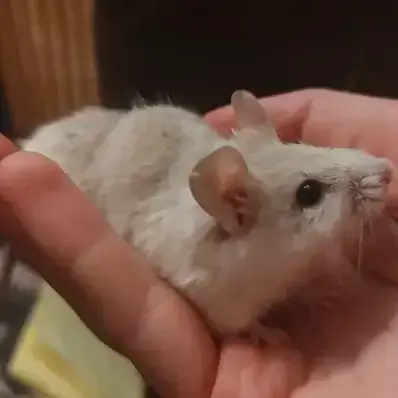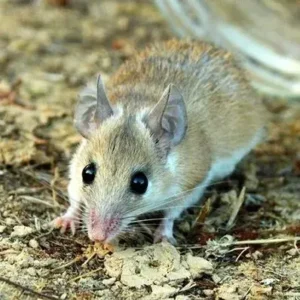Origin of Fancy Mouse
Fancy mice are domesticated descendants of the wild house mouse (Mus musculus), originally native to Asia. Their domestication began over a thousand years ago in China and Japan, where they were selectively bred for unique colors and patterns. In the 19th century, fancy mice gained popularity in Europe, especially in England, leading to the formation of mouse breeding clubs and exhibitions.
Personality
These tiny creatures pack a punch of personality. Despite their size, fancy mice are social, curious, and intelligent. They thrive on interaction and often form close bonds with their owners.
Physical Appearance
Fancy mice look just like regular mice, but they are usually cleaner and cuter. They come in various colors and shades.
- Size
Measuring between 2 to 4 inches, fancy mice are petite yet full of character.
- Coat Color
One of the fascinating aspects of fancy mice is their diverse coat colors and patterns. These include colors like black, chocolate, blue, white, cream, lilac, red, fawn, champagne, cinnamon, golden agouti, silver agouti, silver, and dove.
Gender Differences
There are no major differences between male and female mice in terms of looks or behavior. In general, they act and appear similarly, especially towards their human friends. So, there is no reason to prefer female or male mice over the other when considering them as pets.
Feed/Nutrition
- Commercial Mouse Pellets: Choose a high-quality commercial mouse pellet as the primary component of their diet. These pellets are specially formulated to provide essential nutrients and vitamins. Ensure that the pellets are fresh, free from dust, and stored in a cool, dry place.
- Fresh Fruits and Vegetables: Introduce variety by incorporating fresh fruits and vegetables into their diet. Favorites include apples, carrots, broccoli, and leafy greens. Avoid citrus fruits and onions, as they can be harmful to mice.
- Seeds and Nuts: Offer a small amount of seeds and nuts as occasional treats. These add diversity to their diet and serve as a source of healthy fats. Moderation is key, as excessive seeds can lead to weight issues.
- Fresh Water: Always provide fresh, clean drinking water in a sipper bottle or shallow dish. Regularly check and clean the water dispenser to prevent bacterial growth.
- Protein Sources: Include protein-rich foods such as cooked eggs and lean meats in their diet. These contribute to muscle development and overall vitality. Feed proteins in moderation to prevent obesity.
- Avoiding Overfeeding: Mice are prone to obesity, so it’s crucial to avoid overfeeding. Provide appropriate portion sizes to maintain a healthy weight. Use treats occasionally and only as a reward for specific positive behavior.
Health
Maintaining the health of your fancy mouse is a priority to ensure a happy and fulfilling life. There are specific aspects of the health of these tiny companions that require attention.
- Parasites: Intestinal parasites, like pinworms, can affect mice and compromise their health. Mice that are afflicted with these parasites may exhibit symptoms such as weight loss, diarrhea, or a loss of appetite.
- Tail and Limb Injuries: Physical injuries are common in mice as they are always playing and jumping around. Be cautious when handling your mouse to prevent tail and limb injuries. If an injury occurs, consult a vet promptly for appropriate care.
- Skin Infections: Skin inflammation and fur loss may be caused by infection, infestation with mites or other parasites.
Care and Grooming
Caring for your fancy mouse involves more than just providing the basics. It includes creating a safe and stimulating environment while also addressing their grooming needs.
- Clean Living Environment: Regularly clean their plastic cages to maintain hygienic living space. Remove soiled bedding, and food remnants, and clean the accessories. Ensure proper ventilation while avoiding drafts that could compromise your mouse’s health.
- Bedding Selection: Choose suitable bedding materials like aspen shavings or paper-based bedding to create a comfortable and safe habitat for your mouse. Monitor the bedding for signs of dampness or odor, indicating the need for a change.
- Enrichment Activities: Provide stimulating toys, tunnels, and climbing structures to keep your mouse mentally and physically active. Rotate toys regularly to prevent boredom and encourage exploration.
- Grooming Needs: Fancy mice are generally low-maintenance in terms of grooming, but they do benefit from occasional brushing to remove loose fur. Use a soft-bristle brush designed for small animals to groom your mouse gently. This helps maintain a clean and glossy coat.
- Dental Health: Provide wooden chews and safe items to chew on to help naturally wear down your mouse’s continuously growing teeth. Regular chewing not only supports dental health but also provides mental stimulation.
- Handling Techniques: Handle your mouse gently and confidently to build trust and reduce stress. Gradually introduce handling sessions to acclimate your mouse to being touched and held.
- Regular Health Checks: Conduct regular health checks, looking for any signs of injury, lumps, or changes in fur condition. If you notice anything unusual, consult with a vet for prompt attention and guidance.
Rescue Groups
If you are looking to get a Fancy Mouse, you can adopt one from rescue groups that may have vulnerable mice needing a loving home.
Buy Fancy Mouse
Fancy mice are cheap, small, and common pets that you can find at pet shops and specialized breeders.
Interesting Facts
- Fancy mice are prolific breeders, and a well-socialized pair can make delightful companions.
- These mice are known for their agility, making them entertaining to watch in a specially designed play area.
Best For
Perfect for individuals or families looking for a small, interactive pet that doesn’t require a substantial living space.
Top Names
| Male Fancy Mouse Names | Female Fancy Mouse Names |
| Whiskers | Daisy |
| Peanut | Bella |
| Milo | Squeak |
| Jerry | Lil Queen |
| Milky | Lily |









